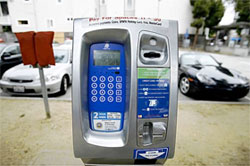San Francisco Moves Forward With Congestion-Busting Parking Reform
 Photo: Christina Izzo/SF Chronicle
Photo: Christina Izzo/SF ChronicleSan Francisco’s Municipal Transportation Agency gave the go-ahead Tuesday to curbside parking reform that will encompass a quarter of the metered spaces in the city — about 6,000 spots. Under the 18-month pilot, called SFpark, the agency will vary prices for on-street parking and city-owned lots based on demand, intending to reduce unnecessary car trips and cut down on cruising for spaces.
The San Francisco Chronicle reports that the target vacancy rate for curbside spaces will be between 10 and 35 percent. New technology will help monitor the results and set prices:
For example, the hourly meter cost would fluctuate between 25 cents
and $6. However, during special events, such as large concerts,
ballgames and street festivals, the charge could go as high as $18.
Currently, meters cost $1.50 to $3 an hour, depending on the
neighborhood.The executive director would also have the authority to change the
price according to location, time of day and day of the week, based on
demand.The city would track parking meter use with a sophisticated system
of sensors embedded in the pavement. High-tech space monitors would be
deployed in lots. The hourly rates would not be adjusted more
frequently than once a month and would not go up or down by more than
50 cents at a time.Drivers won’t have to worry about having enough nickels, dimes and
quarters to feed a meter. Instead, the city will install a new
generation of meters that will allow people to pay by credit card,
prepaid parking cards and, perhaps, cell phones.
When John Kaehny reported on SFpark for Streetsblog this summer, he noted that "big city parking policies have been based on a mixture of political pandering, myths and half-truths." The data collected from San Francisco may go a long way toward dispelling those assumptions.
In New York, the low price of curbside parking results in tens of millions of miles driven each year, according to calculations from Transportation Alternatives, which has urged the Bloomberg administration to take bolder steps on parking policy. For a city where even the more progressive pols grandstand on parking issues for populist cred, shaping the debate is a big challenge. "The public has never heard a good case as to why higher rates are beneficial," Kaehny said.
A pair of six-month DOT pilot programs in Greenwich Village and near Kings Highway in Brooklyn could help change that, Kaehny told us, by collecting data that will bolster the argument for raising rates.